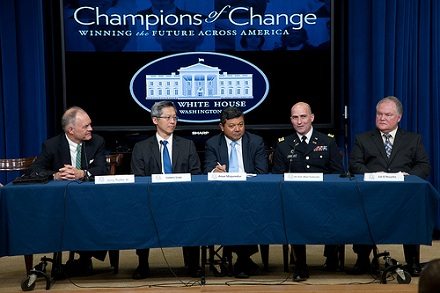
July 12, 2012; Source: Santa Cruz Sentinel (Mercury News)
Did you know that the White House regularly honors community leaders, often nonprofit leaders, as “Champions of Change?” There might not be a lot of money left in the federal budget for nonprofits, but at least some nonprofit leaders are getting recognition that reverberates back to their hometowns and adds credibility and profile to their work.
That’s the case with the latest White House Champions of Change awards, which recognized leaders running programs serving the homeless. The Mercury News and Santa Cruz Sentinel took note of the award to Sparky Harlan who, for 29 years, has run a program in Santa Clara County, Calif. for homeless teenagers. Having recently gathered community leaders to pledge to end youth and family homelessness by 2020, Harlan will be able to use the White House award to keep attention focused on the needs of the region’s homeless and upholding the commitments she received from other decision-makers.
The awards generated similar local news coverage for other award winners. Crain’s Chicago Business noted the honor to Paul Hamann of Night Ministry. Longtime Atlanta-area community development advocate Margaret Schuelke was recognized by the Decatur Metro for her leadership of Project Community Connections, Inc. In a nod to the connection to public sector roles, Beth McCullough got star billing in the Daily Telegram for her work as the homeless education liaison for the public school system of Adrian, Mich. The full list of winners championing the cause of youth homelessness is available on the White House website.
The Champions awards are part of the Obama administration’s “Winning the Future” campaign, which honors people and organizations making a difference in communities. We take special pride in one of the past winners of the Champions awards. In the “service and social innovators” category, one of the award winners was Ivye Allen, the President/CEO of the Foundation for the Mid-South—and a valued member of the Nonprofit Quarterly board of directors.
There is a little bit of a “1,000 points of light” feeling to these White House awards, but the distinctive Obama administration twist to some of these awards is their connection to government programs: the housing counseling award winners who could not have done their work without access to HUD funds, the leaders in building community infrastructure who relied on stimulus program dollars, the community justice champions who frequently did their work with federal legal aid support, and the health care champions who “are helping others in their community understand the impact and opportunities from the health care law, the Affordable Care Act.” These Champions aren’t just volunteer service providers, but social change advocates working at the intersection of community-based services and regional and national public policy.—Rick Cohen
This year, the White House Champions of Change awards recognized leaders running programs
serving the homeless.
White House Recognizes Homelessness “Champions of Change”
July 12, 2012; Santa Cruz Sentinel (Mercury News)
Did you know that the White House regularly honors community leaders, often nonprofit
leaders, as “Champions of Change?” There might not be a lot of money left in the federal budget
for nonprofits, but at least some nonprofit leaders are getting recognition that reverberates back
to their hometowns and adds credibility and profile to their work.
That’s the case with the latest White House Champions of Change awards, which recognized
leaders running programs serving the homeless. The Mercury News and Santa Cruz Sentinel took
note of the award to Sparky Harlan who, for 29 years, has run a program in Santa Clara County,
Calif. for homeless teenagers. Having recently gathered community leaders to pledge to end
youth and family homelessness by 2020, Harlan will be able to use the White House award to
keep attention focused on the needs of the region’s homeless and upholding the commitments
she received from other decision-makers.
The awards generated similar local news coverage for other award winners. Crain’s Chicago
Business noted the honor to Paul Hamann of Night Ministry. Longtime Atlanta-area community
development advocate Margaret Schuelke was recognized by the Decatur Metro for her
leadership of Project Community Connections, Inc. In a nod to the connection to public sector
roles, Beth McCullough got star billing in the Daily Telegram for her work as the homeless
education liaison for the public school system of Adrian, Mich. The full list of winners
championing the cause of youth homelessness is available on the White House website.
The Champions awards are part of the Obama administration’s “Winning the Future” campaign,
which honors people and organizations making a difference in communities. We take special
pride in one of the past winners of the Champions awards. In the “service and social innovators”
category, one of the award winners was Ivye Allen, the President/CEO of the Foundation for the
Mid-South—and a valued member of the Nonprofit Quarterly board of directors.
There is a little bit of a “1,000 points of light” feeling to these White House awards, but
the distinctive Obama administration twist to some of these awards is their connection to
government programs: the housing counseling award winners who could not have done their
work without access to HUD funds, the leaders in building community infrastructure who relied
on stimulus program dollars, the community justice champions who frequently did their work
with federal legal aid support, and the health care champions who “are helping others in their
community understand the impact and opportunities from the health care law, the Affordable
Care Act.” These Champions aren’t just volunteer service providers, but social change advocates
working at the intersection of community-based services and regional and national public
policy.—Rick Cohen
Keywords: Champions of Change, homelessness advocacy, anti-homelessness, nonprofit
leadership recognition, Winning the Future, homeless services













